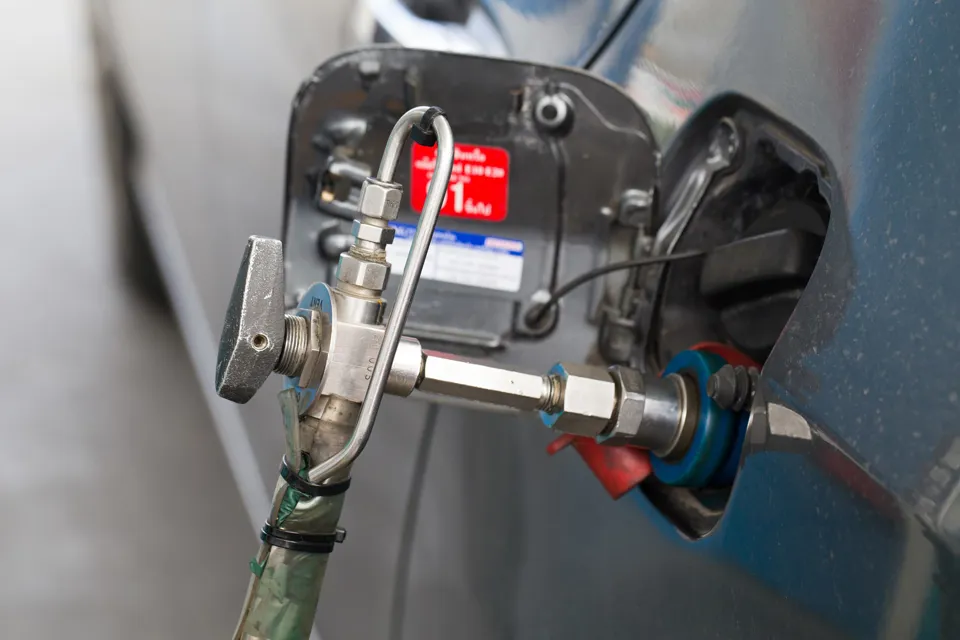CNG (compressed natural gas) is set to become a significant transport fuel, according to Graham Lackey, group managing director of specialist haulage firm Brit European, which operates a number of dual-fuel vehicles.
Brit European has trialled a number of CNG-converted trucks with conversion costs between £24,000 and £32,000 per vehicle but Lackey believes that, once the technology becomes mass market, costs are likely to fall to around £15,000.
Brit European secured a grant from the Technology Strategy Board (TSB) for its conversions and the company targeted a two-year payback period, although at current diesel prices, Lackey suggests estimates up to three years.
Without the grant, the “business case is still there”, although the payback period is 12 months longer.
“The manufacturers are going to respond to what is going on in other parts of the world,” Lackey told delegates at Microlise’s 2015 transport conference.
“China put on the road, or converted, 40,000 gas commercial vehicles last year, America is well on with the experiment and places like Italy have been using gas vehicles for decades. So I think we will see it develop but it will be driven from other parts of the world.”
The environment was a key driver behind Brit European’s decision to convert vehicles to CNG, as part of a strategy written five years ago after the company navigated its way through the recession.
“We sat down and decided where we wanted to go in the future. Two of our key objectives were to reduce our impact on the environment and to see if we could disjoint ourselves from the strong cost of diesel,” Lackey said.
CNG was identified as a possible solution. “In terms of fossil fuels, gas is the cleanest burning fuel,” Lackey said.
“Has the vehicle technology got some way to go to make sure that is transferred to CO2 savings? Probably, but nevertheless it is a clean burning fossil fuel.”
His trial achieved an average CO2 emissions reduction of 12-15% compared to diesel.
The decision to switch some vehicles to CNG also helped Brit European to keep its prices low at a time when diesel prices were spiralling.
“We didn’t feel comfortable with that for the future,” Lackey said. “We very quickly concluded that there was only really one solution for the short-to-medium term, and that was the use of natural gas.”
Lackey felt the technology was proven enough to be viable, and supplies of fuel were more than sufficient.
Brit European has contract maintenance agreements for the gas part of the engine. It carries a small premium over a standard diesel vehicle which is taken into account in the business case.
It’s biggest challenge was convincing fuel providers to set up a refuelling infrastructure for natural gas.
Lackey described it as a “chicken and egg scenario” – HGV operators did not want to put CNG-powered trucks on the road without a sufficient fuel network in place, but fuel providers did not want to provide fuel for trucks which were not yet operating in the UK.
Brit European’s solution was to put its own semi-mobile facility in service, although it required an “18-month fight” to get it agreed with the local planning officials.
Safety concerns about gas were the main stumbling block. “There’s this misconception that is going to blow up like a bomb,” said Lackey. “It kept getting kicked into the long grass and we had to keep going in, and getting it back.”
He added: “We have had no increase in insurance premiums and tanks are ADR-rated so pose no more of a threat than a standard diesel tank.”
The timing of the trial did present the logistics company with a problem. Not only was the price of oil at a low, weakening the argument for gas, but truck manufacturers were also investing in low emissions Euro 6 technology.
Lackey described manufacturer input as “limited” at the start of the trial. But later in the programme it improved, with Mercedes-Benz being particularly helpful.
Brit European opted for a dual-fuel fleet for the added security that, if a vehicle ran out of gas, it could simply switch over the diesel and carry on operating normally.
Lackey believes trucks can run on 100% CNG “as long as fuelling facilities exist”. He added: “In fact, that will be the future for a number of operators, I’m sure.”
He is predicting that the refuelling network will “start to expand, but I don’t see that until about 2017-18”.
“The players at the moment are a bit small. But – trust me – it’s coming,” he said.

















Login to comment
Comments
No comments have been made yet.